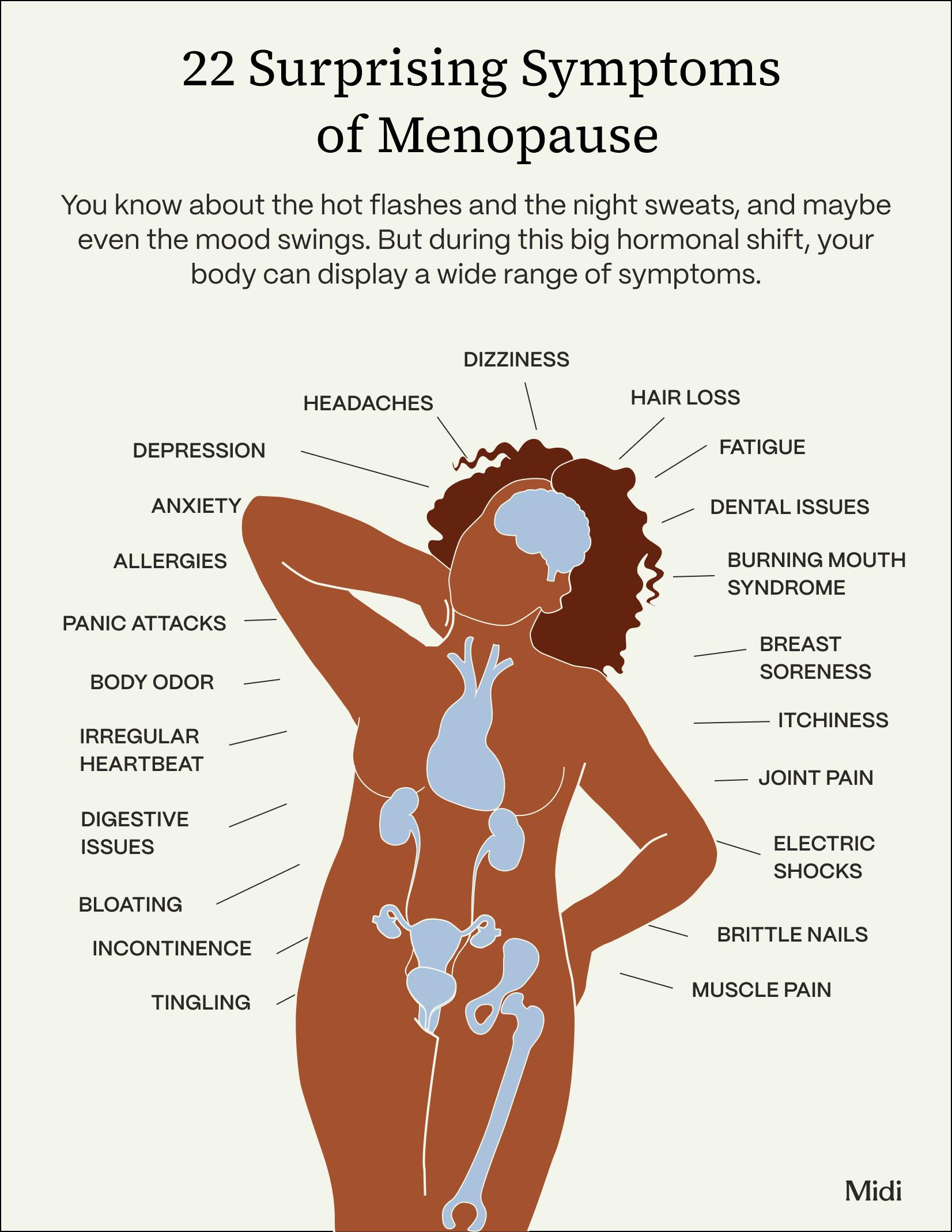- Menopause can be a confusing time, but there are plenty of books that can help you feel less alone during this hormonal shift so feel more knowledgeable and empowered.
- Our curated list—all chosen by top doctors and menopause experts—can help demystify what’s changing in your body, your brain, your sex life, and more.
Sometimes picking a book to read is easy, especially if it’s the latest thriller everyone is talking about or the long-awaited sequel to the best novel you read last year. But when it comes to topics like menopause, choosing the best book can seem a bit more daunting. Alas, there's no biology class on this life stage with a list of required reading.
Instead, it's up to you to sift through the options. With so many to choose from, how do you know which will really address your concerns and questions and which are fluff based on pseudoscience? Allow us to help. We talked to our very own Midi menopause experts to create a list of books we love and trust. They're all evidence-based and empathetic, informative and intelligent, and written by experts with solid bonafides as well as widespread acceptance of their leadership in the field.

When it comes to your health, knowledge really is power. And yet many people experience menopause without a clear understanding of what's going on. In one survey of 3,100 women, 57.6 percent under the age of 40 said they didn't feel at all informed about menopause. It’s not their fault: 80 percent of OB/GYNs have no training in menopause, so there can be a serious information gap, especially at the beginning of perimenopause when symptoms are still mild or vague, and your periods haven’t stopped.
At Midi, we recommend being proactive about your care. Books on menopause written by experts who specialize in women’s hormonal health and have seen it all in practice can be a great starting point. Experts like the below authors have a variety of backgrounds and perspectives—they range from OB/GYNs to psychologists—but share one thing in common: They really know their stuff when it comes to menopause thanks to decades of experience. Pick up a few of these legit titles to help you feel more calm and prepared about what’s going on now and what’s still to come.
But don't stop there: Take what you've learned and share it with a menopause specialist who can personalize treatment to your unique experience.
Understanding Menopause
Menopause can be, in a word, challenging. Symptoms including hot flashes, night sweats, mood changes, trouble sleeping, mysterious weight gain, and more can make you feel like you aren’t yourself anymore. But knowledge can be power. These books, all handpicked by Midi clinicians as titles that are especially helpful, backed by science, and written by knowledgeable experts, can help you navigate menopause with confidence and clarity—and discover solutions to manage symptoms and improve how you feel.
Tips on Choosing What Books to Read
Do you need to read all of these books? Not at all! Pick the ones that speak to your needs the most and touch on what you’re really worried about. Are you looking for medical advice and treatment recommendations? Do you simply want to feel more up to speed on this moment in your life? Do you feel like your relationship could use a boost? Our advice: Start with a book that focuses on whatever is keeping you up at night right now.
Helpful Guides
The New Menopause: Navigating Your Path Through Hormonal Change with Purpose, Power, and the Facts and The Galveston Diet: The Doctor-Developed, Patient-Proven Plan to Burn Fat and Tame Your Hormonal Symptoms by Mary Claire Haver, M.D.
Why we chose them: Written by a board-certified obstetrician and gynecologist, these books will help you figure out exactly what to do to feel your best. The first book is all about symptoms — explaining clearly what treatments are proven to help you not just feel less miserable, but like you’re really thriving. Of course the typical symptoms like night sweats are in there, but so are itchy ears, body odor, and other less-common symptoms. You’ll discover how to advocate for yourself with your healthcare team, ways to handle everything from changes in your appearance to sleep, and what to do to reduce the impact low estrogen levels can have on your health.
In perhaps the more well-known of the two books, The Galveston Diet, Dr. Haver shares her own experience with weight gain and how she cracked the code on how to eat that got her—and thousands of other women—to a healthy, maintainable weight. The word “diet” is in the title, but this is less about deprivation and more about creating a sustainable way of eating healthy during menopause, which is when many women experience weight gain and increased belly fat. It’s part cookbook, part meal plan, and part realistic guide to how to eat to reduce fat and feel your best.
Hot Flash Hell: A Gynecologist's Guide to Turning Down the Heat by Lauren Streicher, M.D.
Why we chose it: Think you need to just suffer through hot flashes for the next decade? Think again. This deep dive into the most common perimenopause symptom, written by the founding Medical Director of the Northwestern Medicine Center for Sexual Medicine and Menopause—and Midi Medical Advisor—will show you how to figure out your personal triggers, what’s really going on in your body, and what you can do to minimize how hot flashes —and other uncomfortable symptoms—impact your quality of life and future health. Need more motivation? Hot flashes aren’t just uncomfortable, they are also linked to an increased risk for cardiovascular disease and other serious health issues.
The Vagina Bible: The Vulva and the Vagina — Separating the Myth From the Medicine by Jen Gunter, M.D.
Why we chose it: An OB/GYN and New York Times columnist breaks down the myths surrounding female genitalia in this “adult sex ed” book. Good for women of any age, there is a section devoted to what happens to your anatomy during menopause and how to keep all your vital lady parts healthy and happy. You’ll finish the book feeling like you finally understand your vagina and know how to treat it.
Grown Woman Talk: Your Guide to Getting and Staying Healthy by Sharon Malone, M.D.
Why we chose it: If you’ve ever felt ignored or marginalized by the medical community, like your concerns were dismissed or unimportant, this book will help you feel the opposite. (It doesn’t hurt that there’s a blurb from Michelle Obama on the cover!) Written by an OB/GYN and expert on menopausal and post-reproductive health, this book’s goal is to reduce your anxiety, give you real solutions, and cheer you on as you go through this phase of your life. The advice centers on how to advocate for yourself and feel in control in healthcare settings…something you can use every time you go to the doctor, whether the appointment is about menopause or not.
Finding Me in Menopause: Flourishing in Perimenopause and Menopause Using Nutrition and Lifestyle by Dr. Nitu Bajekal, M.D.
Why we chose it: Many women wonder just how much of an impact lifestyle changes can have on menopause symptoms. This book answers that question. It was written by an OB/GYN based in the U.K. (she was one of the first board-certified lifestyle medicine physicians there) and the chapters break down what science shows about how changing your habits around diet, exercise, stress, and sleep can have a huge impact on how you feel.

Science Deep-Dives
The Definitive Guide to Perimenopause and Menopause by Louise Newson, M.D.
Why we chose it: Many women don’t know much about menopause when they first start experiencing perimenopause symptoms. This book is designed to get you up to speed so that you feel prepared and empowered about what’s to come. From what is really going on with your hormones to how menopause can impact your career, it’s all here. Sprinkled throughout are stories from women the Dr. Newson has seen in her clinic, which will help you feel a little less alone. And Dr. Newson is the real deal: She funds research and education related to hormone health and is a member of the UK Government’s Menopause Taskforce, where she’s a fierce and effective advocate for the recognition and treatment of menopause symptoms in the United Kingdom.

Estrogen Matters: Why Taking Hormones in Menopause Can Improve and Lengthen Women’s Lives — Without Raising the Risk of Breast Cancer by Avrum Bluming, M.D., and Carol Tavris, Ph.D.
Why we chose it: While lots of books touch on hormone replacement therapy (HRT) to improve menopause symptoms, this one is truly a definitive guide to it. When it was published in 2016, it was instrumental in helping dispel the durable and damaging myths around HRT and opened the door for more and more women to try this life-changing treatment. Written by a medical oncologist and a social psychologist, this book dives into the controversial study showing a link between HRT and cancer risk—revealing how flaws in both the actual study and in the media’s coverage of it led to terrible repercussions for women’s health—and gives a fuller picture of the benefits and potential risks associated with the treatment.
(At Midi, we believe HRT can be transformative for women if they need it—you can connect with a Midi specialist to see if it's right for you.)
The Upgrade: How the Female Brain Gets Stronger and Better in Midlife and Beyond by Louann Brizendine, M.D.
Why we chose it: Throughout the menopause transition, your brain is being reshaped and it’s possible to end up feeling more clarity and purpose than ever before. Packed with personal stories of women who noticed this shift—and tips for how to optimize your brain health for decades to come—this book is a must-read for anyone stressing out about what menopause means for their cognitive well-being.
The Menopause Brain: New Science Empowering Women to Navigate This Pivotal Transition with Knowledge and Confidence by Lisa Mosconi, Ph.D.
Why we chose it: You know the hormonal changes of menopause impact your physical health, but this book focuses on all the ways it can also affect your brain health. Dr. Mosconi, a neuroscientist and expert in everything related to women’s brains, shows how hormones can impact mood, memory, and cognitive function and, perhaps more importantly, what the latest research shows you can do about it.
All About Sex
Love Worth Making: How to Have Ridiculously Great Sex in a Long-Lasting Relationship by Stephen Snyder, M.D.
Why we chose it: Wish you could listen in on what others couples talk about with their sex therapist? Now you can. Sex and couples therapist Dr. Snyder has worked with more than 1,500 patients and has learned what does and doesn’t keep intimacy alive during a monogamous, decades-long relationship (something that can be a pretty useful reminder during menopause). Come for the voyeuristic pleasure of hearing about other people’s sex lives, stay for the actionable tips that you can try in your own bedroom.
Come as You Are: The Surprising New Science That Will Transform Your Sex Life and Come Together: The Science (and Art!) of Creating Lasting Sexual Connections by Emily Nagoski, Ph.D.
Why we chose it: A sex educator, Dr. Nagoski has spent decades teaching others about the intersection of psychology, sexuality, and relationships. These two books have been touted as game changers, showing that the key to a fulfilling sex life starts in your brain and that you can, in fact, keep sex exciting when in a long-term relationship. While not focused on menopause specifically, the practical advice given can help you navigate the ebbing libido that often accompanies dropping estrogen levels.
You Are Not Broken by Kelly Casperson, M.D.
When urologist Dr. Casperson felt unable to help her patients who struggled with sex, she decided to learn everything she could about the intersection of hormones and sexuality. And she poured all of that insight into this book, which will teach you everything you need to know to have better sex, whether it’s fully understanding your anatomy, or shifting your mindset.
Learn More About Sexual Health During Menopause
Want to know more about intimacy at midlife? We teamed up with experts at NYU Langone for an informative webinar full of frank facts and simple, evidence-based solutions that can support your sexual wellness and boost intimacy in your relationship.
Personal Stories
Hot and Bothered: What No One Tells You About Menopause and How to Feel Like Yourself Again by Jancee Dunn
Why we chose it: Too often, the taboo surrounding menopause means nobody talks about it with their friends and, instead, we all end up suffering silently. Dunn, who is also the author of the amazingly titled How Not to Hate Your Husband After Kids, is on a personal mission to change that and crafted this entertaining guide based on plenty of research, in-depth interviews, and her own lived experience. It was the book she wished was around when she began perimenopause, and we’re all grateful she filled the gap.
All Fours by Miranda July
Why we chose it: While it’s not a "menopause" book, it’s also not not a menopause book. This racy novel follows a woman in her mid-40s who is solidly in perimenopause (there’s talk of the looming “estrogen cliff”) and who begins an affair while staying at a motel 30 minutes from her home. Keep in mind that the sex scenes in this book can be pretty explicit, but it might be just what you’re in the mood for.
Black and Menopausal: Intimate Stories of Navigating the Change edited by Yansie Rolston and Yvonne Christie
Why we chose it: Like many other health topics, the stories around menopause tend to center on the white woman’s experience. That can leave women in other cultures feeling left out of the conversation. That’s where this collection of personal stories comes in. By telling their own truths and sharing intimate details, the Black authors are helping show that menopause isn't one-size-fits-all and that, in fact, there is beauty in that diversity.
Midi Patient Experiences
91% of Midi patients report relief from symptoms within two months. Hear from the women we've helped through their perimenopause and menopause symptoms.
If you don’t choose a book from our list, there are plenty of other options out there. Just make sure it’s written by a reputable author with expertise in the subject matter. A few honorable mentions:
- She Comes First: The Thinking Man’s Guide to Pleasuring a Woman by Ian Kerner, Ph.D.
- The Menopause Guidebook by The Menopause Society
- The Menopause Manifesto by Dr. Jen Gunter
- The Complete Guide to the Menopause by Dr. Annice Mukherjee
What other books belong on this list?
Head to our post to add your top picks:
The Takeaway
- Having a better understanding of menopause through well-researched, science-backed books can help you feel calmer and more in control during this phase of your life.
- You can find books that serve as general guides, ones that do deep dives into the science, ones that focus on sexual health, and ones that share personal stories.
- Choose a book that focuses on what you’re most concerned about right now or, for a personalized recommendation, talk with your Midi clinician or other members of your healthcare team.
Frequently Asked Questions (FAQs)
What is the most popular book on menopause?
While there is no definitive ranking of the most popular menopause books, at the time of writing, the #1 book about menopause on Amazon was The New Menopause: Navigating Your Path Through Hormonal Change with Purpose, Power, and the Facts by Dr. Mary Claire Haver.
How can I reverse menopause naturally?
You can’t reverse menopause; menopause is a transition every woman will go through and signals the end of your reproductive years. That said, there are plenty of things you can do to make menopause less disruptive to your physical and mental health, including lifestyle changes and medications. Talk with a healthcare professional, like a Midi clinician, about how you can feel your best throughout menopause.
What is the best practice for menopause?
Menopause can look very different from one person to another. Symptoms can be mild or severe and they can come on suddenly or more gradually. The best practice to keep in mind is having open conversations with your healthcare team. Mention any symptom you’re feeling, even if it seems unconnected to menopause, and ask lots of questions to make sure you fully understand your options for relief.
What is the biggest symptom of entering menopause?
The biggest sign that you’re entering perimenopause (the years leading up to menopause) is irregular periods. They may come closer together or further apart or be lighter or heavier than usual. This is due to the changing hormone levels in your body.
If you’re in perimenopause or menopause and want guidance from clinicians who specialize in women’s midlife health, book a virtual visit with Midi today.
Hormonal change is at the root of dozens of symptoms women experience in the years before and after their period stops.
Our trained menopause specialists can help you connect the dots to guide you towards safe, effective solutions.
Whether you need personalized guidance or a prescription to tackle symptoms—including brain fog, hot flashes, sleep trouble, mood swings, and weight gain—we’ve got you covered.
Midi’s mission is to revolutionize healthcare for women at midlife, wherever they live and whatever their health story. We believe that starts with education, to help all of us understand our always-changing bodies and health needs. Our core values guide everything we do, including standards that ensure the quality and trustworthiness of our content and editorial processes. We’re committed to providing information that is up-to-date, accurate, and relies on evidence-based research and peer-reviewed journals. For more details on our editorial process, see here.






